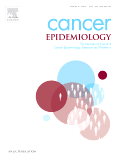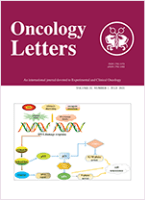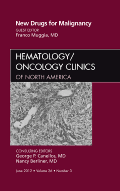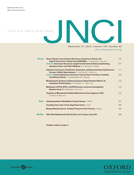
Cancer Epidemiology
Scope & Guideline
Connecting Genetics, Environment, and Lifestyle in Cancer
Introduction
Aims and Scopes
- Epidemiological Patterns and Trends:
The journal publishes studies that investigate trends in cancer incidence, prevalence, and mortality across different populations and time periods, utilizing various statistical methods to analyze these patterns. - Disparities in Cancer Care and Outcomes:
Research focusing on socio-economic, racial, and geographic disparities in cancer treatment and survival is a core area, highlighting the inequalities that affect different demographic groups. - Risk Factor Analysis:
The journal emphasizes studies that explore various risk factors associated with different types of cancer, including lifestyle, environmental exposures, and genetic predispositions. - Screening and Early Detection:
Papers often discuss the effectiveness and accessibility of cancer screening programs, aiming to improve early detection rates and subsequently enhance patient outcomes. - Health Policy and Cancer Prevention:
The journal addresses the implications of health policies on cancer prevention and screening, advocating for evidence-based interventions and public health initiatives. - Innovative Methodologies:
Studies utilizing novel methodologies, such as machine learning and geospatial analysis, to assess cancer epidemiology are encouraged, reflecting the journal's commitment to advancing research techniques.
Trending and Emerging
- Impact of COVID-19 on Cancer Care:
Research examining the effects of the COVID-19 pandemic on cancer diagnosis, treatment delays, and screening participation has surged, highlighting the pandemic's significant impact on cancer care delivery. - Socioeconomic and Racial Disparities:
There is a growing emphasis on studies that investigate socioeconomic status and racial/ethnic disparities in cancer outcomes, recognizing the importance of social determinants of health in cancer epidemiology. - Use of Big Data and Advanced Analytics:
Emerging trends include the utilization of big data analytics and machine learning techniques in cancer research, allowing for more sophisticated analyses of large datasets to uncover patterns and associations. - Longitudinal and Cohort Studies:
An increase in longitudinal and cohort studies that track cancer incidence and outcomes over time is evident, providing valuable insights into trends and the long-term effects of various risk factors. - Environmental Exposures and Cancer Risk:
Research exploring the relationship between environmental factors, such as pollution and occupational exposures, and cancer risk is gaining traction, reflecting a broader interest in the environmental determinants of health.
Declining or Waning
- Basic Science and Laboratory Studies:
There seems to be a reduction in the publication of studies focused solely on the basic science aspects of cancer, such as cellular and molecular biology, as the journal increasingly emphasizes epidemiological and population-based research. - Solely Clinical Trial Results:
The journal appears to be moving away from publishing reports that solely present clinical trial results without epidemiological context, favoring studies that link clinical outcomes with broader population health trends. - Single Institution Studies:
Research focusing on single-institution experiences or outcomes without broader epidemiological implications is becoming less common, as the journal seeks studies with wider relevance and generalizability.
Similar Journals

BULLETIN DU CANCER
Empowering the fight against cancer through knowledge.BULLETIN DU CANCER is a pivotal academic journal dedicated to the field of oncology, providing a platform for innovative research and insights into cancer treatment and diagnostics. Published by Elsevier Masson, Corp Off in France, this journal has been a part of the scientific community since 1966, and is committed to sharing critical findings that influence clinical practices and improve patient outcomes. Despite its recent rankings placing it in the Q4 category for Cancer Research and Q3 for Hematology and other related fields, BULLETIN DU CANCER remains essential for those interested in the latest developments in cancer biology and treatment methodologies. With an emphasis on both basic and clinical research, it serves as a valuable resource for researchers, healthcare professionals, and students seeking to deepen their understanding in various dimensions of oncology. This journal is particularly relevant as it continues to spotlight emerging research trends and supports the global imperative to combat cancer more effectively.

Oncology Letters
Transforming Oncology Knowledge into Clinical PracticeOncology Letters is a prominent academic journal dedicated to disseminating high-quality research in the fields of oncology and cancer research. Published by SPANDIDOS PUBL LTD and based in Greece, this journal has established a significant presence since its inception in 2010 and continues to contribute to the scientific community with a focus on both clinical and experimental oncology. Notably, it holds a respectable Q3 ranking in the categories of Cancer Research and Oncology as of 2023, highlighting its relevance and contribution to these critical fields. With a Scopus rank of #139/404 in Medicine – Oncology and #117/230 in Biochemistry, Genetics, and Molecular Biology – Cancer Research, Oncology Letters serves as a valuable platform for researchers, professionals, and students alike to explore emerging findings and innovative treatment approaches. Though it operates within a traditional subscription model, this journal prides itself on fostering accessible and impactful discourse in oncology, making it an essential resource for those committed to advancing cancer research and improving patient care.

BREAST CANCER RESEARCH AND TREATMENT
Driving Change through Cutting-Edge StudiesBreast Cancer Research and Treatment, published by Springer, stands as a pivotal journal within the domains of Cancer Research and Oncology, exemplified by its impressive Q2 and Q1 quartile rankings, respectively, in the 2023 category rankings. Since its inception in 1981, this journal has provided a vital platform for disseminating cutting-edge research focused on all aspects of breast cancer, ranging from molecular biology to treatment strategies. With an ISSN of 0167-6806 and E-ISSN of 1573-7217, it captures a broad audience of researchers, clinicians, and students dedicated to improving patient outcomes. The journal emphasizes high-quality, peer-reviewed studies that pave the way for advancements in therapy and direct novel insights into oncological practices. By maintaining a strong ranking in Scopus with percentile placements of 74th in Oncology and 61st in Cancer Research, Brest Cancer Research and Treatment continues to foster innovation and collaboration in the fight against breast cancer.

JOURNAL OF CANCER RESEARCH AND CLINICAL ONCOLOGY
Illuminating the Pathways of Cancer Discovery and Treatment.JOURNAL OF CANCER RESEARCH AND CLINICAL ONCOLOGY, published by Springer, is a prestigious peer-reviewed journal dedicated to advancing the fields of cancer research and clinical oncology. With an impact factor reflecting its significance within the academic community, the journal operates under a rigorous quality standard and offers a wealth of knowledge spanning from 1979 and continuing through 2025. With its comprehensive scope, it encompasses a wide array of topics including novel therapeutic strategies, clinical trials, and cutting-edge research methodologies, making it an essential resource for researchers, practitioners, and students alike. The journal’s category quartiles highlight its competitive edge, ranking Q2 in Cancer Research and Q1 in Medicine (miscellaneous) as of 2023. This positioning underscores its role at the forefront of oncology discourse. Through this journal, contributors and readers alike engage with impactful research that informs clinical practices and enhances patient care in oncology. Access to the journal’s content, although not open access, ensures curated and high-quality insights available to the academic and professional community.

Turk Onkoloji Dergisi-Turkish Journal of Oncology
Shaping the future of oncology with dedicated research and expertise.Turk Onkoloji Dergisi - Turkish Journal of Oncology, published by KARE PUBL, serves as a vital platform in the field of oncology, specifically catering to the Turkish-speaking research community and contributing to global discourse. With an ISSN of 1300-7467, this journal, which has been in circulation since 2007 and continues until 2024, recognizes the importance of advancing medical knowledge in cancer research through rigorous peer-reviewed articles. Although currently positioned in the Q4 category of oncology journals with a Scopus rank of #344 out of 404, the journal is dedicated to fostering significant research insights and innovative perspectives on cancer treatment and prevention. While it does not currently offer open access, its content is essential for professionals, researchers, and students aiming to enhance their understanding of oncology developments in Turkey and beyond. The Turkish Journal of Oncology not only aspires to improve the quality of cancer care but also strives to enhance collaboration among researchers, thereby influencing future oncology practices.

Cancer Research Communications
Innovating cancer treatment through shared insights.Cancer Research Communications is an esteemed journal published by the American Association for Cancer Research, a leading organization in the field of oncology. This journal aims to advance knowledge in cancer research through the dissemination of high-quality, peer-reviewed articles that cover a wide range of topics related to cancer biology, treatment modalities, and prevention strategies. As an open-access journal, Cancer Research Communications ensures that vital research findings are accessible to a global audience, promoting collaboration and innovation within the scientific community. The journal serves as a crucial platform for researchers, professionals, and students to share their insights and foster the exchange of effective cancer therapies and methodologies. With a commitment to excellence, it plays a significant role in shaping the future of cancer research and therapeutic development.

HEMATOLOGY-ONCOLOGY CLINICS OF NORTH AMERICA
Connecting Researchers and Clinicians for Better OutcomesHEMATOLOGY-ONCOLOGY CLINICS OF NORTH AMERICA, published by W B SAUNDERS CO-ELSEVIER INC, is a premier journal dedicated to advancing the fields of hematology and oncology. With its ISSN 0889-8588 and E-ISSN 1558-1977, this esteemed publication has been a cornerstone of clinical scholarship since its inception in 1987, providing comprehensive annual updates that bridge the gap between research and clinical practice. Known for its rigorous editorial standards and impactful contributions, the journal holds a respectable Q2 quartile classification in both hematology and oncology as of 2023, ranking it in the 50th percentile among its peers. Although it is not an open-access journal, the content is accessible to institutions and professionals worldwide. As the scope of the journal expands through 2024, it continues to attract an audience of researchers, healthcare professionals, and students who seek to stay informed on the latest advancements, treatment modalities, and groundbreaking studies in the fields of hematology and oncology.

Cancer Reports
Championing innovation in oncology research.Cancer Reports, published by WILEY, is an esteemed open-access journal dedicated to the field of oncology and cancer research. With a focus on disseminating impactful research findings since its transition to fully open access in 2021, Cancer Reports aims to facilitate knowledge sharing among researchers, clinicians, and healthcare professionals globally. The journal is positioned within the Q3 quartile for both Cancer Research and Oncology categories as of 2023, reflecting its commitment to quality and relevance in a competitive publishing landscape. With an ISSN of N/A and an E-ISSN of 2573-8348, the journal showcases studies across diverse aspects of cancer biology, treatment modalities, and patient care strategies. Located in the United Kingdom at 111 River St, Hoboken 07030-5774, NJ, Cancer Reports strives to contribute to the advancement of cancer research and improve health outcomes for patients worldwide, making it a pivotal platform for scholars and practitioners in the oncology community.

JCO Global Oncology
Fostering Collaborative Advancements in OncologyJCO Global Oncology is a premier open-access journal published by Lippincott Williams & Wilkins, dedicated to the dissemination of high-quality research in the fields of cancer research and oncology. Since its inception in 2020, this journal has rapidly established itself as a vital resource for researchers, healthcare professionals, and students, holding a distinguished position in the Q2 category for both Cancer Research and Oncology based on the latest metrics. With an impressive Scopus rank of #61 out of 636 in General Medicine, the journal is recognized for its rigorous peer-reviewed articles and cutting-edge insights into oncological science. The open-access model ensures that vital research is readily available to a global audience, fostering collaborative advancements in the fight against cancer. JCO Global Oncology explores a broad range of topics and encourages submissions that contribute to the understanding, prevention, and treatment of various malignancies. With its substantial impact and ongoing contributions to the field, it stands as a promising platform for advancing oncological discourse and knowledge.

JNCI-Journal of the National Cancer Institute
Unveiling the complexities of cancer for better outcomes.JNCI-Journal of the National Cancer Institute, published by Oxford University Press Inc. in the United Kingdom, is a premier journal dedicated to advancing the field of cancer research and oncology. With a distinguished history dating back to 1940, this journal has consistently maintained a strong reputation within the academic community, achieving a remarkable Q1 ranking in both Cancer Research and Oncology as of 2023. Researchers and practitioners rely on the JNCI for original research articles, review papers, and cutting-edge findings that impact clinical practices and therapeutic strategies. Although it does not currently offer open access, the journal remains a vital resource for academicians and healthcare professionals seeking to enhance their understanding of cancer mechanisms and treatment innovations. Its rigorous peer-review process ensures the publication of high-quality, credible research that meets the evolving challenges of cancer treatment and prevention through to 2024.